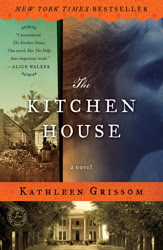Synopsis (from the book jacket):
Orphaned during her passage from Ireland, young, white Lavinia arrives
on the steps of the kitchen house and is placed, as an indentured servant,
under the care of Belle, the master’s illegitimate slave daughter. Lavinia
learns to cook, clean, and serve food, while guided by the quiet strength and
love of her new family.
In time, Lavinia is accepted into the world of the big house, caring
for the master’s opium-addicted wife and befriending his dangerous yet
protective son. She attempts to straddle the worlds of the kitchen and big
house, but her skin color will forever set her apart from Belle and the other
slaves.
Through the unique eyes of Lavinia and Belle, Kathleen Grissom’s debut
novel unfolds in a heartbreaking and ultimately hopeful story of class, race,
dignity, deep-buried secrets, and familial bonds.
About Kathleen Grissom (from Simon & Schuster’s website):
Kathleen Grissom was born and raised in Saskatchewan, Canada, and is
now happily rooted in south-side Virginia, where she and her husband live in
the plantation tavern they renovated. The Kitchen House is her first novel.
Review:
I happened upon this novel at a bookstore a few weeks ago and bought it
based on nothing but the quote on the cover where Alice Walker said, “This
novel, like The Help, does important work.”
We live in a time where preconceived notions of race and family are
blurred. Though The Kitchen House is set two centuries in the past, Grissom
shows characters struggling with the very same issues. Lavinia is white, yet,
for all intents and purposes, a slave. Belle is the illegitimate daughter of
the master, seemingly his favorite child, yet her skin color bars her from
being accepted in the big house, much less in society. Both young women are
trapped between two worlds into which they can never fully fit. Both are raised
by families that aren’t their own and from whom they are forced to separate.
Both are victims of the same shattered man. I desperately wanted to hate that
man, but Grissom gave me just enough insight into his childhood to keep one
sliver of my sympathy alive.
The prose is gorgeous, the characters complex, and the story
engrossing. It does, as Alice Walker said, “important work.”
Have you read The Kitchen House? I’d love to hear your thoughts.


No comments:
Post a Comment